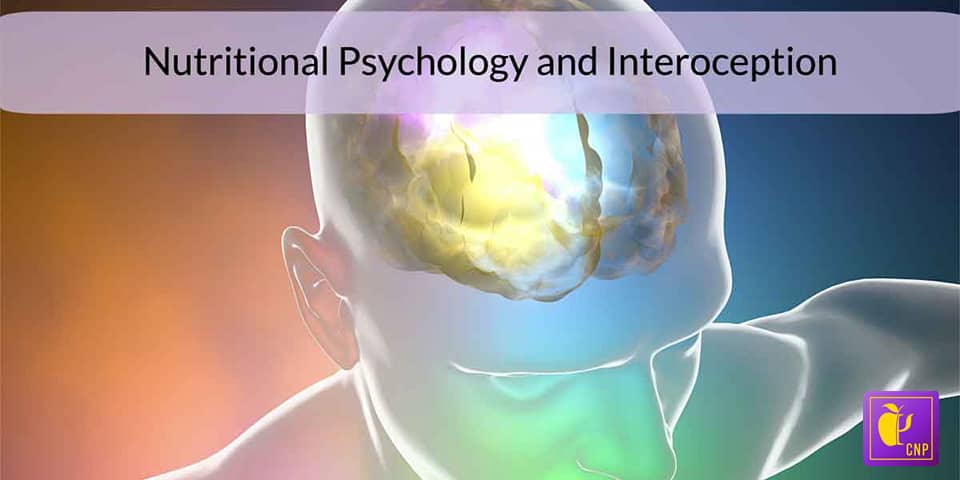Interoception in Nutritional Psychology

Is Interoception a missing Element in our understanding of an improved Diet-Mental Health Relationship?
What is Interoceptive Awareness (IA), how does it relate to the field of Nutritional Psychology, and how can it be used to improve our understanding of the Diet-Mental Health Relationship (DMHR)?
While you have likely heard of the five basic senses, there is one sense in particular that often escapes formal education. Brushed off as something that should be innate, Interoception refers to the senses we feel relating to the internal state of our body. Sometimes referred to as “the eighth sense,” Interoception provides awareness of the sensations arising inside our body – like from a growling stomach, an increased heart rate, or the physical feelings we experience inside our body when anticipating a super tasty treat. The field of Nutritional Psychology (NP) considers Interoception to be an important factor in understanding the effects that our dietary intake patterns can have on our mood, behavior, and mental health.
It can sometimes be difficult to discern exactly what we are sensing, feeling, and needing in relation to our dietary intake choices and patterns. When combined with the growing landscape of highly palatable foods available, we can find ourselves facing self-regulation challenges that cause us to crave more highly palatable foods, and less of the nutritious foods supportive of our brain, our psychological health, and our behavior.¹ In the end, reaching for these foods provides a somewhat satisfying “quick-fix,” but also affects the brain’s interoceptive functioning, which in turn, furthers our appetite for highly palatable foods.²
Building skills in Interoceptive Awareness (IA) is a Nutritional Psychology tool that can be used to help us feel less reactive when reaching for food. Approaching food from the perspective of what is needed to feel good, instead of in reaction to the need to satisfy a craving, can be a key element in supporting our mood, behavior and mental health, and improving our Diet-Mental Health Relationship (DMHR). Less nutritious foods have their place in our diets when we’ve built cognitive, perceptual, behavioral, psychological and interoceptive skills that support us in making conscious choices in our daily dietary intake patterns.
The field of Nutritional Psychology builds Interoceptive Awareness (IA) in individuals to increase their understanding of the bodily sensations they experience in response to their dietary intake patterns and habits. This awareness can lead us to a way of approaching food that is influenced more by internal awareness, choices and decisions, rather than impulses and reactions — which is what Nutritional Psychology is all about.
Citations
- Diet – Mental Health Break #1 | The Center For Nutritional Psychology – CNP https://www.youtube.com/watch?v=n_FJmhTS7HQ&t=4s. Based on study by Richard J. Stevenson et al. (2020) Hippocampal-dependent appetite control is impaired by experimental exposure to a western-style diet. Royal Society Open Science. DOI: 10.1098/rsos.191338.
- A four-day Western-style dietary intervention causes reductions in hippocampal-dependent learning and memory and interoceptive sensitivity. https://pubmed.ncbi.nlm.nih.gov/28231304 or https://journals.plos.org/plosone/article/file?id=10.1371/journal.pone.0172645&type=printable (full paper).
- CNP Research Library, Diet and Interoception Category: https://www.nutritional-psychology.org/research_studies/diet-and-interoception/








Leave a comment